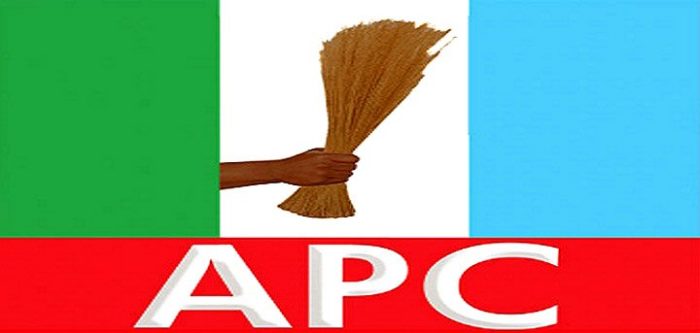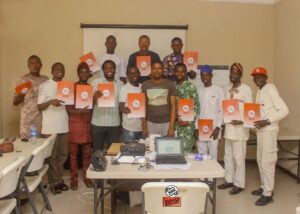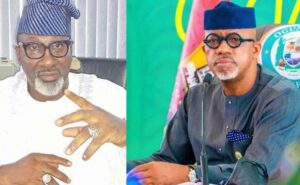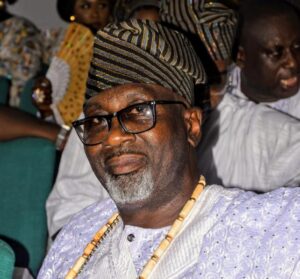APC, defecting senators and the challenge of history. Perhaps, the biggest issue the All Progressives Congress (APC) has to deal with is what is now known in the media as ‘the Gale of Defections’ in which some members of the national and states’ House of Assembly governors, local government chairmen, councilors, an ambassador, the national spokesman and local party chieftains abandoned ship and headed to the main opposition party, the People’s Democratic Party (PDP).
The APC leaders seem unprepared for the development, even though it had been inevitable since the party formed government in 2015 at the federal level and in 24 states. The APC that had done so well as an opposition party when it was formed in 2014 has appeared so incompetent in handling the fortune of electoral victory and the resultant power. Its leaders have behaved like the ancient general who got used to crushing external wars that he returned home to provoke internal battle within his own army. Such generals always end up on the wrong side of history as their commanders end up bringing down the entire army.
Those who left APC have complained of lack of justice, equity, internal democracy, inclusion as well as the rise of a cabal within the government which has seized control of the administration and ensures it cares no hoot about whether it delivers on the pre-election promise of economic recovery, fighting corruption and eliminating insecurity.
However, what has surprised me is the manner in which the APC leaders have been responding to the point raised by the defectors, particularly the ones in the Senate, which included the Senate President, Dr Abubakar Bukola Saraki. Instead of reassessing its performance in the areas mentioned by the defecting senators, the party simply revved up its propaganda machinery and started feeding the public with lies. In the process, they demonstrated their lack of respect for the provisions of the constitution and extant laws of the federation, universally acknowledged parliamentary conventions and ethos, as well as our country’s political history.
Let me summarize the reactions of the APC leaders as it can be deduced from the statements credited to Messrs Adams Oshiomhole, Lai Mohammed, Abu Ibrahim, Abdullahi Adamu, Ali Ndume and some other less known individuals on the party’s propaganda team. One, the defection is illegal. Two, the defection is unprecedented. Three, there is needed to forcefully reconvene both chambers of National Assembly because there are urgent issues to be deliberated upon. Four, when they force the parliamentary reconvening, their loyal senators will either force Saraki to resign or remove him by whatever means. Five, Saraki and the other defectors have no electoral value. Six, blame Saraki as the singular factor responsible for why the Buhari government has failed to perform.
APC leaders since the time they were in the opposition believe they are adept at propaganda and that they can always weave some narratives to explain any situation the party finds itself. Their fabrications were a major element in the defeat of President Goodluck Jonathan. In fact, they are already spewing forth claims that the first 16 years of the present democracy had been a waste and that their last three years have been devoted to correcting the ills. I guess this is a debate the country will have to deal with later on as we inch towards 2019.
Let us return to the six claims of the APC as enumerated above.
Is the defection of the aggrieved senators and others illegal? Definitely not. Section 68 (1) (g) of the constitution of the Federal Republic of Nigeria which stipulates the grounds on which a legislator will vacate his seat gives a proviso which covers the present ‘gale of defections’. It states that the defecting legislators shall not lose his seat if “his membership of the latter political party is not as a result of a division in the political party of which he was previously a member or a merger of two or more political parties or faction by one of which he was previously sponsored.”
If the APC so badly mismanaged its conventions and congresses as well as the general party administration up to the point that the r-APC emerged, formed a factional executive and even went to court to challenge the authenticity of the Oshiomhole group, then whose fault is it? The APC on its own created the condition contained in the constitutional proviso in Section 68 (1) (g). If the APC wants an interpretation of the word “division” as stated in the constitution, as democrats, its leaders know where to head: the court.
In fact, it is the PDP which has legal grounds to challenge the defection of a few of its members like senators Fatimah Raji Rasaki, Sunny Ogbuji and Hope Uzodinma who just recently changed camp from a united and peaceful PDP to the APC. And this fact must have been the reason that these senators fraternise with APC but refused to formalise their defection in the senate chambers. The new APC senators may also be waiting to stage a return to the PDP if at the conclusion of the party primaries they do not get what they want.
The APC have been claiming to be in the majority and that it is unprecedented for the party that has a majority to lose out in providing leadership. These claims raise a lot of questions. As at today, there are verifiable claims that the APC has lost its majority to PDP or that both parties are at par. I believe there may be need for a headcount on the two sides of the Senate chambers when they properly reconvene on September 25.
More importantly, if for the sake of extending the argument we assume without conceding that the APC has a slim majority in the Senate, does that automatically translate to the change of the two presiding officers in the chambers? Going by the provision of the constitution, history and parliamentary convention in a presidential system of government, the answer is no.
Section 50 (1) (a) of the constitution clearly states that “There shall be – a President and a Deputy President of the Senate who shall be elected by members of that House from among themselves.” This means that every senators, no matter their party affiliation is qualified to be Senate President, provided the senator can get the majority of the votes. In fact, in the present senate, the only senator who is a member of the All Progressives Grand Alliance (APGA), Victor Umeh, is qualified to be elected Senate President.
One can recall that this same APC was a mere assembly of rag tag opposition and sectional parties until PDP members of the National Assembly and governors joined them with fanfare in 2014. At that time, two of the biggest catches were Senator Saraki and Rt-Hon Aminu Waziri Tambuwal, who was then speaker of the House of Representatives.
Tambuwal became Speaker in 2011 with the help of the Action Congress of Nigeria (ACN), one of the legacy parties that formed the APC, against the wish of the PDP which wanted Hon. Mulikat Adeola Akande. He later defected to APC and remained as Speaker to the end. In fact, when he defected, Lai Mohammed, then Major General Mohammadu Buhari and Hon Femi Gbajabiamila who are also pissed off by the current ‘gale of defection’ were effusive in their praise for his action. What a double speak!
In 1979, the National Party of Nigeria (NPN) had the majority in both chambers of the National Assembly, yet, the Speaker of the House of Representives was Rt Hon Edwin Ume-Ezeoke of the Nigeria People’s Party (NPP). In the Senate, the Deputy Senate President was Senator John Wash Pam of the NPP in a Senate with NPN majority. Thus, the immediate past arrangement where Senator Saraki of the APC emerged as Senate President while Senator Ike Ekweremadu of PDP is his deputy has an antecedent in the Second Republic. In fact, in 2007, Vice President Abubakar Atiku defected to ACN in a PDP administration and the court endorsed the arrangement.
Also, in 2015, in Plateau and Benue states, the minority party, APC in this case again, provided the speaker while the PDP conceded in the interest of peace. So, what is different in the eighth senate that the APC leaders are threatening to bring the parliament or Nigeria down if they are not allowed to change the leadership of the legislature?
The APC leadership is also threatening that they would not wait for September 25, the adjourned date of the National Assembly to reconvene the legislature because there are some urgent issues to be deliberated upon. What are the urgent issues: the election budget proposal of INEC and the nominations into the Independent Corrupt Practices Commission (ICPC)? It has been confirmed that INEC has enough provision in the 2018 budget to last it till October by which time the NASS would have reconvened to consider its election budget. Also, why does government in this country wait till the last minute before submitting election budgets to the legislature? Since 1999, it has been known that general elections will hold every four years. Is the rush a pre-planned strategy to prevent the legislature from scrutinizing the proposed expenditure and the rationale for it? This is an issue that should form the subject of another debate,
Also, the process for reconvening the Senate before an adjourned date is explicitly stated in Order 12, Rules 1, 2 and 3 of the red chamber’s Standing Order. The rule states that the leaders of all the parties in the Senate must write a letter requesting the Senate President to reconvene the Senate on a particular date for the purpose of dealing with issue(s) of urgent national importance. If the Senate President is convinced by the purpose of the request, he will then direct the clerk of the Senate to give notice to all members to resume for plenary on a particular date. It is after fulfilling these conditions that the issue of quorum as defined in Section 54 (1) of the constitution will now come into play.
Thus, the APC senators who are desirous of reconvening the Senate before the adjourned date of September 25 need the PDP leadership and more importantly, the Senate President to realise their wish. And one is sure that they know that for as long as their intention is dubious, devious and selfish, the premature reconvening will not legally take place.
Again, if the APC plans to forcefully change the Senate leadership under Saraki, they should familiarize themselves with the provision of the constitution in Section 50 sub-section (1) (c). By that provision, the Senate President can only “be removed from office by a resolution of the Senate…by the votes of two-thirds majority of members of that House.”
On the issue of whether Saraki and other defectors have electoral value or not. I think ‘res ipsa loquitor’, as lawyers will say. Let me use the only woman among the defectors in the Senate to demonstrate that the APC spinners need another narrative to earn their pay. Senator Monsurat Sunmonu was Speaker, Oyo State House of Assembly between 2011 and 2015 before becoming a Senator. What that means is that she won elections into the Hose of Assembly and on the floor of the House of Assembly. And somebody will come in now and say she has no electoral value. Did Buhari ever win an election in Kwara State before 2015 when Saraki raised his hand up in Ilorin?
The last point about the claim that Saraki was responsible for the failure of the government to fulfill its electioneering promise is very laughable. The man must be a god to be going in and out of the Code of Conduct Tribunal, Appeal and Supreme Court in the last three years and still retain the potency to ensure that the Almighty APC administration with its ubiquitous and formidable cabal fails to provide good governance to the people.
I think the claim is a mere scapegoating, setting up excuses for government’s failure and escapism. The APC Goebbels can do better in finding a more logical excuse. This won’t jell with Nigerians. 2019 election is still some seven months away. Some more rigorous thinking will provide better explanations. Shikena!










